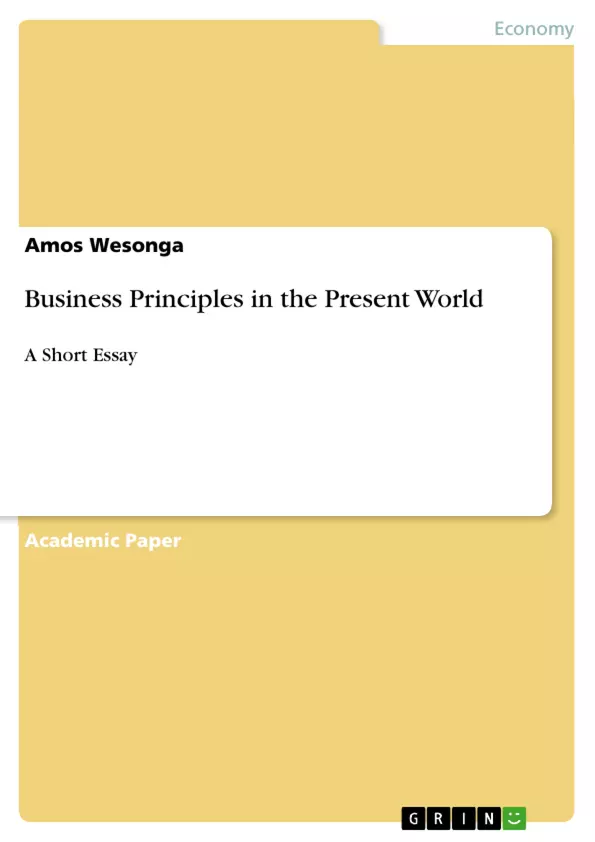This text discusses, what is important for a manager in the present world to be successful with his or her business.
Today's world calls for managers who are versatile so that they can embrace so that their firms can remain afloat. The reason is that today’s business world is made up of ambiguities and uncertainties due to the rapid changes that keep on being churned out by various sectors of the economy.
Managers should learn from the story of Kodak, which refused to embrace change and has consequently been pushed out of the market by the players who embraced change. The rigidity and high-handedness exercised by managers of the previous decade or century may not work in the present world.
Inhaltsverzeichnis (Table of Contents)
- Chapter 1 Discussion
- Chapter 2 Discussion
- Chapter 3 Discussion
Zielsetzung und Themenschwerpunkte (Objectives and Key Themes)
This text explores the crucial skills and attitudes that managers need to navigate the complexities of today's business world. It emphasizes the importance of adaptability, ethical considerations, and cultural awareness in shaping successful leadership.
- The importance of versatility and adaptability for managers in a rapidly changing business environment.
- The role of effective communication in building rapport with employees and stakeholders.
- The need for managers to embrace social changes and ethical considerations to maintain a positive image and avoid legal repercussions.
- The impact of cultural differences on leadership styles and workplace dynamics.
- The benefits of cultural awareness in fostering a cohesive and productive work environment.
Zusammenfassung der Kapitel (Chapter Summaries)
Chapter 1 Discussion discusses the essential skills required for managers to thrive in today's dynamic business landscape. It highlights the importance of versatility, communication, analytical skills, and relationship building in navigating uncertainty and change. The chapter uses the example of Kodak's downfall to illustrate the consequences of rigidity and resistance to change.
Chapter 2 Discussion examines the impact of evolving social attitudes on managerial practices. The chapter emphasizes the need for managers to embrace diversity, inclusion, and ethical conduct to avoid negative consequences such as legal challenges and brand damage. The importance of business ethics in building customer loyalty and long-term success is also discussed.
Chapter 3 Discussion explores the implications of cultural differences in the workplace. It emphasizes the significance of cultural awareness in promoting understanding, respect, and productivity among diverse teams. The chapter highlights how managers can navigate cultural sensitivities to foster a harmonious and effective work environment.
Schlüsselwörter (Keywords)
The main keywords and focus topics of this text include managerial skills, adaptability, communication, social change, business ethics, cultural awareness, diversity, inclusion, and workplace dynamics. The text explores how these concepts are crucial for effective leadership in a globalized and rapidly evolving business environment.
Frequently Asked Questions
Why is versatility important for modern managers?
The business world is filled with ambiguities and rapid changes; versatile managers can adapt their firms to remain competitive and "afloat."
What can managers learn from the Kodak story?
Kodak's failure to embrace digital change serves as a warning that rigidity and resistance to innovation can lead to being pushed out of the market.
How do social changes affect managerial practices?
Managers must embrace diversity, inclusion, and ethical conduct to maintain a positive brand image and avoid legal repercussions in today's socially conscious environment.
What is the role of cultural awareness in the workplace?
Cultural awareness helps managers navigate differences in leadership styles and communication, fostering a more cohesive and productive work environment.
Why is effective communication crucial for business success?
It builds rapport with employees and stakeholders, helping to navigate uncertainty and ensuring that organizational goals are clearly understood by everyone.
- Quote paper
- Dr. Amos Wesonga (Author), 2018, Business Principles in the Present World, Munich, GRIN Verlag, https://www.grin.com/document/999892



